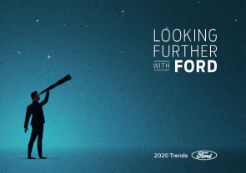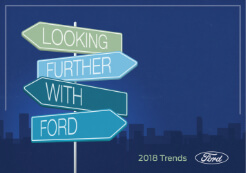The results for Ford Trends 2022 are based on 14,006 online interviews across 15 countries, conducted under the direction of The Harris Poll. The survey was conducted among the general population, ages 18 years and older in the following countries: Australia, Brazil, Canada, China, France, Germany, India, Italy, Mexico, Saudi Arabia, South Africa, Spain, United Arab Emirates, the United Kingdom and the United States. Respondents from Saudi Arabia and United Arab Emirates were required to be nationals of their respective countries; data from these two countries were combined and analyzed in aggregate. All fieldwork took place between October 27 and November 12, 2020. While the data within countries were weighted to be representative, the overall sample of 14,006 was not weighted across countries. That is, we do not claim that aggregated data is representative based on country population sizes across the participating countries.
| Region | Country | Sample Size |
| Australia | 1,001 |
| Brazil | 1,000 |
| Canada | 1,000 |
| China | 1,000 |
| France | 1,000 |
| Germany | 1,001 |
| India | 1,000 |
| Italy | 1,000 |
| Mexico | 1,000 |
| Spain | 1,000 |
| Middle East | Saudi Arabia | 501 |
| South Africa | 1001 |
| Middle East | UAE | 502 |
| U.K. | 1,000 |
| USA | 1,000 |
| Total | 14,006 |
We have defined generational cohorts as follows: Gen-Z (18-23), Millennials (24-39), Gen-X (40-55), Boomers (56-74).









